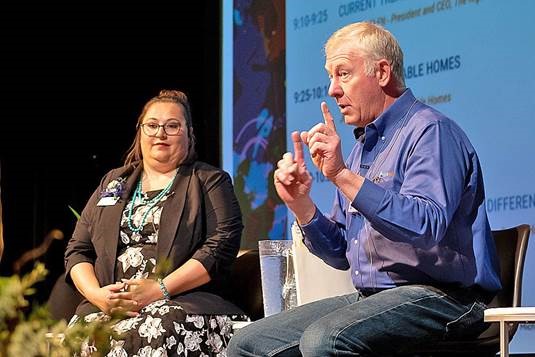
John Bitely examines the struggles and successes of working in rural communities to construct high-density housing
In the Greenville Daily News’ fourth segment of its Focus on Housing series, published April 11, Sable Homes President John Bitely details the affordable housing issues facing rural West Michigan communities.
Speaking at the United Way Community Leadership Conference on March 18 at Belding High School, Bitely shared his thoughts on the issue he said will take higher levels of involvement from local communities to solve. He said this is especially true in looking to create an affordable market of homes for those who are designated as ALICE — Asset Limited, Income Constrained and Employed, the Greenville Daily News reported.
“We all can probably agree that we need housing, but the challenge is, how do we keep it affordable, how do we make it work out, especially toward this ALICE group, especially the lower groups beyond that?” Bitely asked, the newspaper reported. “One of the things that is going on right now, there isn’t any housing available. If you are a young person trying to get started and you’re ready to buy your first home, there’s nothing available.”
As housing prices have skyrocketed in the last two years, with the majority of homes being sold well above the asking price, Bitely said it’s rare to find anything at $200,000 or below while being deemed a desirable place to permanently live.
Part of the issue, according to Bitely, is that newly built homes that could potentially be sold at a more affordable price range simply can’t be built.
“What’s happening to myself and my company, we’re not allowed to build these houses anymore,” he said.
Bitely said there is a growing demand, especially from younger generations, to move out of larger cities and find an affordable single-family home in a more suburban setting.
“Our millennials are very happy to live in a community like that,” he said. “They grew up happy living in downtown, inner cities, in a townhouse, spending the first 10 years of their lives getting their lives established in communities like that. Now, they are more than glad to live that way (suburban developments), but yet our community leaders are saying, ‘No. If it’s not two acres or more, we don’t want a house on it.”
When searching for any sort of compromise, Bitely said it’s going to take community involvement and collaboration to find a resolution in addressing a lack of affordable housing locally in both Montcalm and Ionia counties.
“If you don’t encourage some growth, you’re going to die — communities need to hear that,” Bitely said. “So I’m going to encourage people to become these community leaders. Some (public officials) are not going to change their minds and the only way you are going to change things is by voting. One of my goals was to make some of you uncomfortable, to wake you up. At the end of the day, it’s what we do that makes a difference. We can fix these problems.
“Most of our communities do not need a 300-home development,” he continued. “They need about 50 to 80 homes at a time. That is the growth amount we can sustain, that is the amount I can build because of today’s restrictions on labor. That’s about what our infrastructures can support.”
Read the full story, here.
